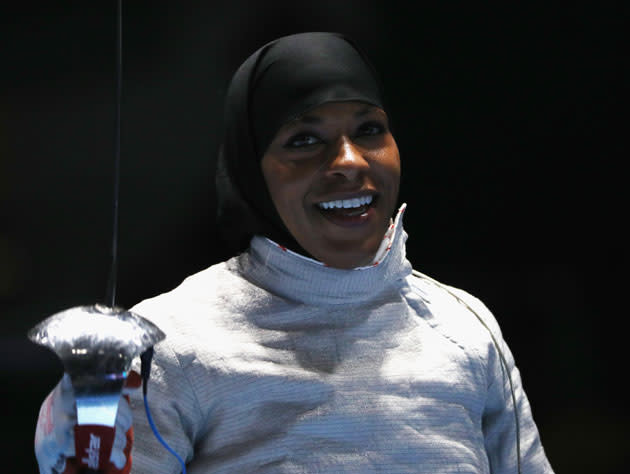FIBA votes to allow basketball players to wear religious headgear during games

FIBA will allow hijabs, turbans and yarmulkes to be worn during international basketball competition. The move, voted upon unanimously by international basketball’s governing body, will lay waste to a 20-year ban on the headgear. The new measure allows participants of all faiths and backgrounds to focus instead on the game at hand, rather than worrying if harmless statements of faith would get in the way of the international committee’s rules on attire.
The move leaves the door open for the NBA and WNBA, leagues that currently ban similar headgear, to update their bylaws. In February, 15 WNBA players signed an open letter demanding that FIBA overturn the same ban the organization struck down this week.
[Follow Ball Don’t Lie on social media: Twitter | Instagram | Facebook | Tumblr]
The Associated Press reported the confirmation on Friday:
“I think we came out in a good place, at the right place,” said USA Basketball CEO Jim Tooley, who is on the FIBA executive committee.
“I think it’s a good step for FIBA to put this issue kind of behind it and go from there.”
Iranian national basketball team player Shadi Abdolvand said basketball will change in Iran because younger players will be encouraged to “pursue their goals.”
The unfettered pursuit of athletic goals was the point of establishing a governing body like FIBA in the first place; to embolden growth of the sport while assuming some control over how the game is developed and broadened on a global scale. Those attempts would be severely hamstrung by limiting potential players from entering friendly competition due to headgear injunctions.
FIBA’s new ruling was “developed in a way that minimizes the risk of injuries as well as preserve consistency of the color of the uniform.”
From the organization’s press release:
The provisions of the new rule mean that headgear is allowed when:
– it is black or white, or of the same dominant color as that of the uniform;
– it is one same color for all players on the team (as all accessories);
– it does not cover any part of the face entirely or partially (eyes, nose, lips etc.);
– it is not dangerous to the player wearing it and/or to other players;
– it has no opening/closing elements around the face and/or neck;
– it has no parts extruding from its surface.
Former WNBA president Val Ackerman, now in charge of the Big East, applauded the move. From Adele Jackson-Gibson at Excelle:
“This is a victory for inclusion in international basketball,” Big East commissioner Val Ackerman, who served on FIBA’s central board from 2006–2014, told Excelle Sports. “I think the immediate beneficiaries are Muslim female athletes, [but] the prohibition applied to all kinds of headgear, so many groups will be affected by this modification.”
FIBA initially attempted to make the move to ban hijabs and head scarves “apolitical and areligious,” according to Ackerman. Jackson-Gibson relayed that the since-struck down bylaw demanded that “players shall not wear equipment (objects) that may cause injury to other players,” a sensible enough fear, because “authorities were worried about head wraps, caps and pinned scarfs slipping off and becoming a potential hazard on the court.”
It was a reasonable concern out of practice, but an outmoded one. In a sport where an entire career could change due to the misplacement of a basket stanchion, or a finger caught in an opponent’s tailored uniform, expecting those that have worn yarmulkes, hijabs, scarves and the like for their entire lives to be somehow haphazard with them during gameplay borders on unreasonable.
The next step is for the NBA, a league that often works in reasonable terms, to consider ending its own headgear ban. The league allows for NBA-issued headbands, but currently will not allow any of the religious headgear listed above, nor any of the secular showcases that some players have sought to trot out in years past.
Denver Nuggets big man Kenneth Faried, responding to rumors of a potential ban lifting earlier in 2017, is keen to see a change.
“I am a Muslim, and I think anybody should have the right (to wear headgear),” said Nuggets forward Kenneth Faried, who also signed the letter and won a gold medal with the U.S. in the 2014 Basketball World Cup. “Jewish – hey, if you’re Gothic, whatever your religion is – Muslim, Christian, Catholic, it doesn’t matter. You should be able to support your religion and wear whatever is part of your religion.”
Within reason, of course, but that’s nothing that a strain of sensible discussion couldn’t suss out.
FIBA has already taken the lead in this realm. The ball is now in the NBA’s figurative court.
– – – – – – –
Kelly Dwyer is an editor for Ball Don’t Lie on Yahoo Sports. Have a tip? Email him at KDonhoops@yahoo.com or follow him on Twitter!
More from Yahoo Sports:
• Aaron Hernandez suicide note to fiancée released
• LaVar Ball accused of ripping off shoe logo
• Ex-Oregon star found after escaping state custody
• Jay Cutler expects regret, but says NFL retirement is permanent

 Yahoo Sports
Yahoo Sports 

